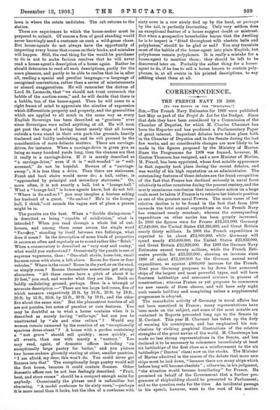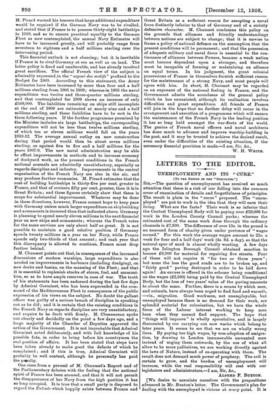CORRESPONDENCE.
THE FRENCH NAVY IN 1909.
(TO TR! EDITOR Or THE " SPICCTATOR..]
SIR,—The French Navy Estimates for 1909 were published last May as part of the Projet de Loi for the Budget. Since that date they have been considered by a Commission of the Chamber of Deputies, for which M. Charles Chaumet has been the Reporter and has produced a Parliamentary Paper of great interest. Important debates have taken place both in the Chamber of Deputies and in the Senate during the last few weeks, and no considerable changes are now likely to be made in the figures proposed by the Ministry of Marine.
Since the Programme for 1909 was framed, however, M. Gaston Thomson has resigned, and a new Minister of Marine,
M. Picard, has been appointed, whose first notable appearance in that capacity took place during the recent debates, and was worthy of his high reputation as an administrator. The outstanding features of these debates are the frank recognition of the fact that France has declined seriously in naval force relatively to other countries during the present century, and the nearly unanimous conclusion that immediate action on a large scale must be taken if France is to retrieve her historic position as one of the greatest naval Powers. The main cause of her relative decline is to be found in the fact that from 1900 onwards the total annual expenditure on the French Navy has remained nearly constant; whereas the corresponding expenditure on other navies has been greatly increased. In 1900 the figures were for France £12,511,000, Germany £7,649,000, the United States 213,385,000, and Great Britain nearly thirty millions. In 1908 the French expenditure is expected to be about E12,800,000, while Germany will spend nearly £16,600,000, the United States £25,833,000, and Great Britain £32,820,000. For 1909 the German Navy Estimates exceed twenty millions, while the French Esti- mates provide for £13,316,000; showing an increase since 1900 of about £12,500,000 for the German annual naval expenditure, as against £800,000 increase for the French. Next year Germany proposes to lay down four armoured ships of the largest and most powerful types, and will have fourteen battleships and armoured cruisers in process of construction ; whereas France as yet proposes to commence no new vessels of these classes, and will have only eight such vessels building and completing unless a supplemental programme is adopted.
The remarkable activity of Germany in naval affairs has not been unnoticed in France ; many representations have been made on the subject, and some of the most notable are contained in Reports presented long ago to the Senate by M. Cuvinot. This year M. Chaumet has taken up the duty of warning his countrymen, and has emphasised his con- clusions by striking graphical illustrations of the relative strengths of the great navies of the world. M. Chautemps has made no less strong representations in the Senate, and has declared it to be necessary to commence immediately at least six battleships of the first class as a reinforcement to the six battleships Danton ' class) now on the stocks. The Minister of Marine admitted in the course of the debate that more new ships must be laid down, "because there are many ships which before long will become obsolete " ; otherwise, in his judgment, " the situation would become humiliating" for France. He promised on behalf of the Government that a further pro- gramme of shipbuilding should be presented to Parliament; and so the question rests for the time. An incidental passage in his speech, however, went to the root of the matter.
M. Picard warned his hearers that large additional expenditure would be required if the German Navy was to be rivalled, and stated that if France is to possess thirty-eight battleships in 1919, and so to ensure practical equality to the German Fleet as now contemplated, the annual Navy Estimates will have to be increased greatly, and will probably range from seventeen to eighteen and a half millions sterling over the intervening period.
This financial outlook is not cheering; but it is inevitable if France is to rival Germany at sea as well as on land. The latter policy is fixed and unalterable, and has already involved great sacrifices. The official French view of the subject is admirably expressed.in the "ezposi des motifs" prefixed to the Budget for 1909. According to this statement, the Army Estimates have been increased by more than four and a half millions sterling from 1905 to 1909; whereas in 1905 the naval expenditure was twelve and three-quarter millions sterling, and that contemplated for 1909 shows an• increase of only £568,000. The liabilities remaining on ships still incomplete at the end of 1909 are estimated at nearly nine and a half millions sterling, and these liabilities have to be met in the three following years. If the further programme promised by the Minister includes six large battleships, the corresponding expenditure will not be less than twelve millions sterling, of which ten or eleven millions would fall on the years 1910-12. The average annual outlay on new construction during that period would then be about seven millions sterling, as against five to five and a half millions for the years 1907-9. The new naval administration may be able to effect improvements in methods and to increase economy of dockyard work, as the present conditions in the French national arsenals are admittedly unsatisfactory, especially as regards discipline and industry. Improvements in the central organisation of the French Navy are also in the air, and may produce further economies. M. Picard estimates that the cost of building battleships is thirty-five per cent. greater in France, and that of cruisers fifty per cent. greater, than it is in Great Britain; and these figures certainly show that there is scope for substantial improvement. Whatever may be done in these directions, however, France cannot hope to keep pace with Germany unless much larger expenditure on shipbuilding and armaments is incurred than that indicated above. Germany is planning to spend nearly eleven millions in the next financial year on new ships and armaments ; whereas the French votes for the same services are only about half as great. It is not possible to maintain a good relative position if Germany spends twenty millions in a year on her Navy, while France spends only two-thirds of that amount ; and each year that • this discrepancy is allowed to continue, France must drop further behind.
M. Chaumet points out that, in consequence of the increased dimensions of modern warships, large expenditure is also needed on improvements in harbours (including dredging), on new docks and basins, on the manning of the Fleet; and that it is essential to replenish stocks of stores, fuel, and ammuni- tion, so as to have ample reserves in case of war. The truth of his statements has been endorsed during the last few days by Admiral Germinet, who has been superseded in the com- mand of the Mediterranean Fleet in consequence of the public expression of his views on the subject. No doubt the gallant officer was guilty of a serious breach of discipline in speaking out as be did ; and it is certain that the existing conditions in the French Navy as regards discipline are very unsatisfactory, and require to be dealt with firmly. M. Clemenceau spoke out clearly and decidedly on the point a few days ago, and a largo majority of the Chamber of Deputies approved the• action of the Government. It is not improbable that Admiral Germinet acted deliberately, and with fall knowledge of his possible fate, in order to bring before his countrymen the real position of affairs. It has been stated that steps have been taken already to make good the defects of which he complained ; and if this is true, Admiral Germinet will probably be well content, although he personally has paid the p*alty.
One rises from a perusal of M. Chanmet's Report and of the Parliamentary debates with the feeling that the national spirit of France has been aroused, and that it will not permit the disappearance of her Navy from the high position it has so long occupied. It is true that a small party is disposed to regard the Entente which happily exists between France and Great Britain as a sufficient reason for accepting a naval force distinctly inferior to that of Germany and of a strictly defensive character. M. Chaumet condemns this policy on the grounds that alliances and friendly understandings between nations are subject to change ; that it is unwise to frame a policy of national defence on the assumption that the present conditions will be permanent; and that the possession of adequate military and naval force is essential to the con- tinuance of alliances between Powers, because a weak nation must become dependent upon a stronger, and therefore must be incapable of forming or maintaining an alliance on equal terms. In his judgment, the great colonial possessions of France in themselves furnish sufficient reason for the maintenance of a strong Navy, and most people will agree with him. In short, M. Chaumet may be regarded as an exponent of the national feeling in France, and the Government admits the soundness of the general policy which he has enunciated, although its realisation involves difficulties and great expenditure. All friends of France will join in the hope that no further delay will occur in the arrangement and execution of a programme which will ensure the maintenance of the French Navy in the leading position it has so long held amongst the war-fleets of the world. The genius of French naval officers and naval architects has done much to advance and improve warship-building in the past, and it may be trusted to achieve the desired result, even under the difficulties of the existing situation, if the necessary financial provision is made.—I am, Sir, &c.,
W. H. WrirrE.































































 Previous page
Previous page